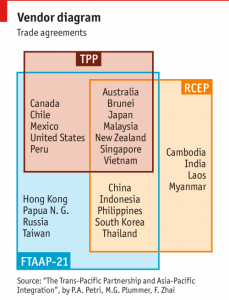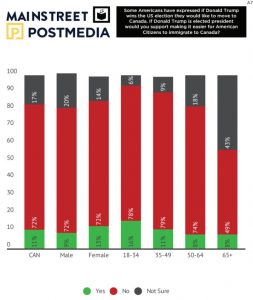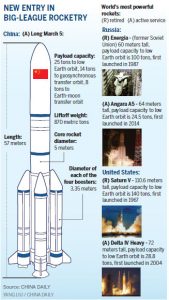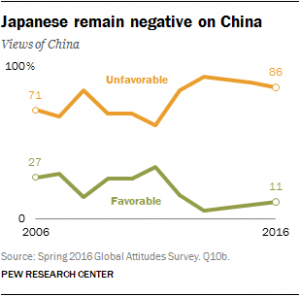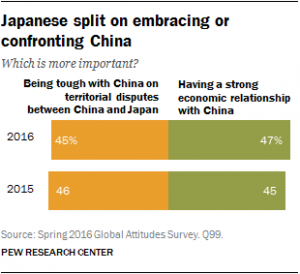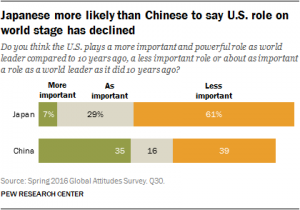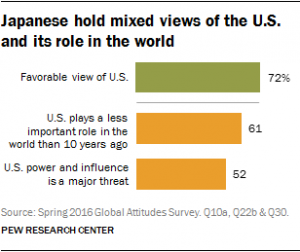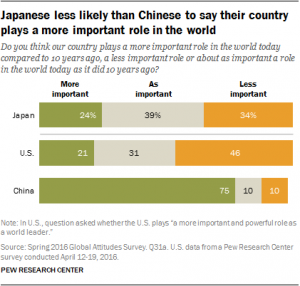Will Trump Launch a Trade War with China?
President-elect Trump is a media whiz and a master of rhetoric and demagoguery who has captivated those under-educated predominately WASP (and Catholic) blue collars and rural rednecks who perceive themselves as losing out in the race against workers in other countries coupled with the onslaught of technology. One mantra that he has successfully drilled into their tiny and narrow minds is that “China is raping America” through unfair trade practices such as manipulating its currency, outwitting US officials at the negotiating table, or unfairly undercutting US competition by subsidizing exports, among numerous other charges.
Two and a half weeks before his election, Trump unveiled his “100-day plan to Make America Great Again”. Apart from pledging to turn Washington upside down and inside out, he set his administration’s agenda on trade, energy, climate change, security and immigration. Of particular interest is the seven priorities for “protect(ing)” American workers, the first four of which deals with trade. First, he would renegotiate the North America Free Trade Agreement (NAFTA) with Canada and Mexico; and failing that, would withdraw from it under Article 2205. Then, he promised to renounce Obama’s Trans-Pacific Partnership (TPP) framework (that excludes China); after which he would label China a currency manipulator, and finally “identify all foreign trading abuses that unfairly impact American workers” and take all measures to halt them and punish the perpetrators.
First, let’s look at NAFTA under which all three countries have reaped enormous benefits in terms of jobs, trade, and investment. Asked about the prospect of renegotiations for the two-decade old agreement by NPR, Eswar Prasad, a renowned trade and currency economist at Cornell University opined that doing that “would not be a trivial matter”. Changing it would hurt many US businesses and farmers that are dependent on well-established supply chains and distribution systems based on the agreement. Nonetheless, Trump could make life very difficult for businesses doing cross-border trade by using his administration’s enforcement mechanisms. So, while NAFTA would live on in name, it would be gravely injured if not on its deathbed in spirit, Mr Prasad underscored.
TPP, a key pillar of the Obama Administration’s ‘pivot’ to Asia, has yet to be ratified by the US Congress. President-elect Trump’s condemnation of the pact as a “disaster” plus that this time around the Republicans control both the House and the Senate, not to mention maintaining a big majority among state governors, has ensured that the agreement is dead-in-the-water. In fact, a former economic advisor to Vice-President Biden most recently Twittered the Obama government has given up on a lame-duck vote on it. Meanwhile, the China-led Regional Comprehensive Economic Partnership (RCEP) negotiations are forging full-speed ahead that encompasses more than 3 billion people inhabiting China, India, ASEAN, Japan, South Korea, Australia, and New Zealand. In a mirror image of TPP, the US is not included in the talks.
Trump made ‘China-bashing’ a hallmark of his campaign and he has pledged to call China out as a currency manipulator. In addition, his campaign manifesto called for an end to China’s “illegal export subsidies”, lax labour laws, and ineffectual environmental standards, promising to “cut a better deal with China that helps American businesses ad workers compete”. Claiming China keeps the RMB artificially low to boost its exports, Trump has threatened “appropriate countervailing duties on artificially cheap Chinese products” to the tune of as much as 45% (along with 35% on Mexican products). The American government has not designated China a currency manipulator since the Clinton Administration in 1994 and both the Bush junior and Obama Administrations refrained from doing so.
Trump has seesawed on the issue during the campaign though. In a Republican candidate debate back in March, he clarified that his statement on anti-China tariffs was merely a threat. “The 45% is a threat that if they don’t behave, if they don’t follow the rules and regulations so that we can have it equal on both sides, we will tax you”, he explained. And when asked about the high probability for igniting a trade war, Trump cavalierly retorted, “who the hell cares?”
But, will Trump follow through with his threat after all? If he does, the ramifications for both economies will be devastating indeed. In a September report, the pro-trade Washington-based Peterson Institute for International Economics stated a trade war with China would shock the US economy back into a recession and cost as many as 4 million private sector jobs nationwide, hitting lower-income and lower-skilled workers disproportionately more, the very constituents that voted in force for him. In a related report the Institute modelled that regionally, specifically California, could lose 640,000 jobs by 2019 with Los Angeles hardest hit losing 176,000 jobs.
Capital goods industries would be worst affected that would strongly ripple throughout the economy, erasing jobs in retail, restaurants, and temporary employment agencies. Chinese tit for tat retaliation would be a certainty. By simply instructing its state-owned enterprises to cease buying US company services, for instance, California could lose almost 14,000 high-end jobs, with nearly 6,000 lost in LA and Orange counties alone. If China put purchases of American aircraft on hold, the entire region would experience additional job losses. It is interesting to note that the last time the US erected protectionist barriers against foreign imports back in the 1930s, they exacerbated and prolonged the Great Depression.
Yet, some analysts believe Trump may take some action, if not a full-powered 45% tariff. In a note to clients, Wei Tao, a China specialist at Societe Generale wrote a high tariff is out of the question but a watered-down tariff of 15% (and a lesser one for Mexico) is entirely possible. A 45% tariff would be ruinous for China’s exports to the US. In a note, Kevin Lai, an analyst with Daiwa Capital Markets estimated Chinese exports bound for the US could plummet by an astounding 87% or $420 billion whereas a 15% tax would see Chinese exports fall by 31% that could cut 1.75% off China’s GDP. But, because it is a key driver of the world economy, a trade-battered China would produce tremendously negative repercussions across the globe that is already witnessing weak demand and eventually rebound squarely on the US.
So, will Trump resort to ‘cutting off the nose to spite the face’? The world will be watching with nervous anticipation over the initial months of his administration.
Will China Lead on Climate Change Due to Trump?
The question for Trump may be who he wants to lead the world on climate change: the U.S., or China?
While it will take time — possibly the entire Trump presidency — to roll back many Obama’s climate achievements, make no mistake: It will become much harder for the world to meet its climate goals with Trump in the White House.
This fact could have ramifications lasting decades or more as the planet responds to increased greenhouse gases in the air.
However, there is reason to be optimistic: global energy trends are moving in favor of renewables over coal and other fossil fuels. The worldwide push toward solving global warming that occurred during Obama’s presidency has gained enough momentum that it is not going to stop even if the U.S. turns into a rogue state on this issue.
“A shift to a low carbon economy,” says Mark Watts, the executive director of the C40 Cities Climate Leadership Group, “is too well-embedded in large parts of the world, particularly China, for it to be overturned.”
China, in fact, reiterated on Friday that with or without the U.S., it is firmly committed to continuing to reduce its emissions.
“Our policies and action will not be impacted by any action by the U.S. government,” Chen Zhihua, of China’s National Development and Reform Commission, said at the latest round of UN climate talks in Morocco on Monday.
– Mashable
Pubertal Antics of Hong Kong Separatist Legislators

A pro-China protester carries a printout depicting newly elected Hong Kong lawmaker Sixtus Leung representing a traitor during a demonstration outside the Legislative Council in Hong Kong Wednesday, Oct. 26, 2016. More unruly scenes erupted in Hong Kong?s legislature Wednesday as two newly elected lawmakers defied an order barring them from retaking their oaths after being disqualified earlier for insulting China. (AP Photo/Kin Cheung)
Three weeks ago, several radical separatist ‘Localist’ legislators recently elected to Hong Kong’s Legislative Council (LegCo) put on a pubertal show of utter contempt for the Hong Kong SAR and the mainland.
Youthful would-be legislators Yau Wai-ching and Sixtus “Baggio” Leung altered their parliamentary oaths to uphold Hong Kong’s Basic Law with Lau saying she “(bore) true allegiance to the Hong Kong nation”. When told to repeat the oath correctly, she resorted to abusing the name of the People’s Republic using foul words and a derogatory war-time Japanese term for China ‘Chee-na”. Not to be out done, Sixtus Leung draped a banner declaring “Hong Kong is NOT China” and again uttered the disparaging word ‘Chee-na’. Lau Siu-lai read her pledge in slow motion, taking 10 minutes to finish the 77-word oath while other pro-secessionists tore up prop copies of the Basic Law.
In the face of such an dispicable affront to Hong Kong dignity and Chinese sovereignty, China’s National People’s Congress (NPC) took the unprecedented step of blocking Ms Yau and Mr Leung from taking their oaths a second time after being initially disqualified by the LegCo President. The NPC issued an interpretation of a section of the Basic Law on oaths sworn by incoming legislators. Li Fei, deputy secretary-general of the NPC Standing committee told reporters at a subsequent Beijing news conference, “breaking ‘One Country, Two Systems’ is violating the law, not voicing a political view…There will be no leniency (for the perpetrators)”.
Lau and Leung exemplify a new breed of radicalized Hong Kong youths who see little hope for their future just as their mainland cousins enjoy continuing improvements in their daily lives and China as a country leapfrogs over other countries in almost every facet of economy, society, and even politics. As a pro-Localist journalist wrote in hkej.com last February, “(There is) a growing sense of hopelessness engulfing Hong Kong people”. Dissatisfaction with their economic plight easily translates into grievances against the Hong Kong government and the existing process for electoral democracy in the enclave.
Especially in the wake of the “Occupy Central” demonstrations that brought key thoroughfares and districts in Hong Kong to a standstill in 2014, groups with Localist sympathies have since galvanized into political parties dedicated to full-fledged Hong Kong independence either now or in the post ‘One Country, Two Systems’ world after 2047. They include Hong Kong Indigenous, Hong Kong National Party, and Youngspiration with the latter and Demosisto, another radical grouping, calling for a referendum on independence after “One Country, Two Systems” ends. Still others advocate a return to British rule such as the Hong Kong Independence Party and the Alliance of Resuming British Sovereignty over Hong Kong and Independence.
But, these groups represent an extremist fringe of the populace. A survey conducted by the Chinese University of Hong Kong (CUHK) over the summer showed only 17.4% of respondents sympathetic to the prospect of becoming independent after 2047 and a mere 3.6% stating that independence is “possible”. Opponents of Hong Kong independence cite several reasons for the improbability of actual secession: For one thing, Article I of the Basic Law stipulates Hong Kong is an inalienable part of China and so advocacies for independence have no legal basis. Second, Most Hong Kongers trace their ancestry and kinship to the mainland not to mention sharing language and culture. Nathan Law Kwun-chung of Demosisto and Edward Leung of Hong Kong Indigenous, for instance, were both born on the mainland.
In practical terms, devoid of any major natural resources, Hong Kong is overwhelmingly dependent on the mainland for the basic necessities of life – food, water and electricity. In fact, the produce and meats that Hong Kongers consume are some of the most premium products exported from neighbouring Guangdong and other provinces. In terms of economic growth, Hong Kong benefits immensely from its close association with Shenzhen across the border and other manufacturing and high-tech hubs in the Pearl River Delta. The mainland is Hong Kong’s largest trading partner and thus crucial to Hong Kong’s continued prosperity. As China gradually supplants the US as the global superpower, movements to distance Hong Kong from the mainland can only be folly.
Most important, with memories of the Century of Humiliation still fresh in the minds of the Chinese people, no central Chinese government, whether Communist or of any other ilk, can/will tolerate any moves toward secessionism on the part of Taiwan, Hong Kong, Tibet or Xinjiang. In Hong Kong’s case, a People’s Liberation Army (PLA) garrison is stationed in the heart of the city. You can be sure with the mainland’s growing political wisdom and economic might coupled with military strength and prowess, any armed rebellion, let alone referenda, for formal Hong Kong independence will be put down with prejudice.
Canadian Immigration Website Crashes After Trump Win
As election night results showed a win for Donald Trump, nervous Americans considering an exit strategy apparently crashed Canada’s immigration website. The site has been working intermittently throughout the night with high levels of traffic.
Canadian Prime Minister Justin Trudeau entertained the idea of welcoming Americans fleeing a Trump presidency in March. But, Canadians are not keen on the idea.
A poll released Tuesday shows the overwhelming majority of the nation is opposed to easing immigration policies in the event of a Trump victory. The poll, conducted by Mainstreet Research and Postmedia Network Inc., also reveals that most Canadians would support Clinton for U.S. president.
“This election has been quite divisive south of the border and many Canadians are anxious about the outcome on Tuesday,” said Quito Maggi, president of Mainstreet Research.
– Huffington Post
OBOR Could Be Environmental Superhighway: Study
The “New Road for Telecoupling Global Prosperity and Ecological Sustainability” report by Michigan State University scholars states China’s ambitious One Belt One Road (OBOR) initiative, involving more than 100 countries and international organizations, could create routes filled with opportunity.
The authors use the new integrated telecoupling framework, which allows scientists to understand and govern the interconnections of socioeconomic and environmental issues that span the globe. The approach factors in changes that ripple across regions, accounting for what otherwise might be unforeseen and unintended consequences.
The stakes are particularly high with environmental concerns such as climate change, air and water pollution and food security demanding immediate solutions, said Jack Liu, director of the Center for Systems Integration and Sustainability (CSIS) and the Rachel Carson Chair in Sustainability at Michigan State.
“Environmental challenges like climate change; biodiversity loss; desertification; air, water, soil, and ocean pollution; and natural disasters rarely honor man-made borders, so now is the time to start building mechanisms to create environmental wins. But this also requires a sophisticated way of understanding the impacts that come with change,” he said.
The report recommends roles for groups like the United Nations in climate adaptation and mitigation, poverty alleviation and other areas. The group also suggests building infrastructure to allocate people, resources and energy equitably and efficiently; boost technological transfer with cultural and religious exchanges, and so on.
– Xinhua
Duterte’s ‘Domino Effect’?
Whether you call Philippine President Rodrigo Duterte’s badmouthing of the Obama Administration and US Congressional politicians blustering or bluff, there is no doubt that his ‘pivot’ to China and demands for the eventual withdrawal of American troops from Philippine soil has caused considerable anxiety and consternation in Washington. One analyst writing in the National Interest called it the “Duterte Effect” as he questioned whether the loose cannon president is triggering a ‘Domino Effect’ among ASEAN countries in terms of recalibrations of policy toward China and the South China Sea.
Last week, angered by the US State Department’s halt of a planned sale of 26,000 rifles to Philippine police forces, Duterte lashed out at the “fools” and “monkeys” behind the decision. Last week also saw a state visit to Beijing by Malaysian Premier Najib Razak during which he concluded a whopping US$34.25 billion set of 14 agreements which, much to the displeasure of the US, included the purchase of four Chinese-made ships, two of which will be built in China and the other two in Malaysia. Mr Najib also lauded the China-backed Asian Infrastructure Development Bank as a turning point “of peaceful dialogue, not foreign intervention, in sovereign states”. His trip followed closely on the heels of Duterte’s state visit mid last month when he declared a “separation” from the US.
In an editorial in the China Daily, Najib admonished former colonial powers for ill-treating smaller countries, Malaysia having been a colony of Britain and Philippines of Spain and the US for some 50 years before the end of WWII. “It is not for them to lecture countries they once exploited on how to conduct their own internal affairs today”. In spite of being a disputant with China over islands in the South China Sea (which Najib wrote should be settled through bilateral negotiations), Malaysia is keen to strengthen ties with China in the wake of lawsuits filed by the US Justice Department accusing Najib of complicity in the misappropriation of US$3.5 billion from IMDB. Over the summer, Najib dismissed the lawsuits as US interference in the country’s affairs.
So, are we witnessing a ‘domino effect’ involving two key ASEAN countries that could substantially influence the behavior of other smaller Southeast Asian states or is it as one pro-US scholar described as “sensationalism” and “exaggeration” on the part of the Western and other press?
As it stands, within ASEAN, Cambodia (Kampuchea) remains China’s staunchest ally and since the 2014 military coup, Thailand has steadily tilted in favour of Beijing. And while post-election Myanmar is diversifying relations with the West and Japan, Aung San Suu Kyi’s historic 5-day visit to China in summer 2015 resulted in the signing of a big batch of agreements and infrastructure deals. Meanwhile, Laos and Vietnam, while maintaining traditional ties with China, are hedging their bets a little by welcoming all comers, including the docking of both US and Chinese frigates at Vietnam’s Cam Ranh Bay which proved so crucial during the Vietnam War. Finally, although Indonesia’s policies toward China and the US are still a work in progress, Americans can still depend on its all-weather lap dog Singapore for unflinching support. But, even that relationship isn’t as solid as it used to be.
A Chinese foreign policy blogger cited three reasons for Malaysia’s chumming up with China on top of Malaysian annoyance at American-style interference in its domestic affairs: First, China is already investing US$7.3 billion in a major port in the Strait of Malacca with a high-speed rail link-up from China to Thailand and through Malaysia to Singapore coming down the pipeline. Second, on the disappearance of Malaysian Airlines flight MH370, although China exerted strong pressure on Malaysian authorities, it also afforded the country significant leeway in the handling of the search and its aftermath. Finally, Malaysia is keen on playing a central role along the Maritime Silk Road through Southeast Asia and secure a big chunk of infrastructure projects that China proposes to build in the region.
The Japanese government and media are particularly inscensed over the domino effect of Duterte’s stoking of anti-US rhetoric and steering away from the US, Ma Yao, a guest scholar at the International Relations and Public Affairs School at the Shanghai Foreign Languages Institute opined to the Chinese media. First, in a matter of months Duterte has managed to muck up US-Japan’s grand strategy to contain China through a diamond-shaped axis that has been years-in-the-making. Second, a democratically elected Duterte chose to huddle with authoritarian China and negotiate bilaterally on South China Sea claimant issues instead of coordinating policy with the US and Japan and spite of the Philippines’ shared political system and ideology. Third, the Japanese were completely taken aback by Duterte’s behavior who in their view should have consulted with Japan before going to China. That Duterte chose to go to China first was a harder slap in Japan’s face.
At the same time, scholar Ma recognizes that Japan’s fears of dominos vis a vis the South China Sea disputes may be overblown as the US will continue to exert pressure on its allies within ASEAN to stay the course and refrain from negotiating directly with the Chinese. Moreover, despite the Duterte setback, the Americans hold hopes for Vietnam to play a bigger role since, for one thing, it has a much more robust naval force. Finally, few Southeast Asian politicians share Duterte’s style of no=holds-barred cannon blasting and few of them enjoy the strength of domestic political support that the Philippine President currently enjoys. In this respect, the US and the West are criticizing Duterte on the very issue that garners for him such high loyalty. – his war on drugs and taking the fight to drug-traffickers. This is where, among other things, China’s policy of non-intervention has Duterte enamoured.
China Launches Heavy-Lift Long March 5 Rocket
China launched its first heavy-lift Long March 5 carrier rocket late last Thursday, marking a new milestone in the country’s space industry.
As China’s first-generation heavy-lift rocket, the Long March 5 has a liftoff weight of 870 metric tons, and a maximum payload capacity of 25 tons to low Earth orbit and 14 tons to geosynchronous transfer orbit.
The 57-meter-tall rocket, the tallest in China’s carrier rocket family, thundered away with a blinding white flash from the Wenchang Space Launch Center in the island province of Hainan at 8:43 pm. It ferried the Shijian 17 scientific experiment satellite and a Yuanzheng 2 upper stage, which is capable of putting multiple payloads into different orbits during a single mission.
As the nation’s strongest and most technologically advanced launch vehicle, Long March 5 will enable China to put its future manned station into space and send unmanned probes to Mars, according to the State Administration of Science, Technology and Industry for National Defense, which oversees the rocket’s development.
China will start launching parts of its permanent manned space station starting in 2018 and put the station into service around 2022. The nation also will send an unmanned probe to Mars to orbit and land around 2020, said space officials.
The Long March 5 rocket has two core stages and four boosters. It uses liquid oxygen/kerosene and liquid oxygen/liquid hydrogen as propellants, making the rocket friendlier to the environment than previous Long March types, according to the China Academy of Launch Vehicle Technology in Beijing.
Beyond Long March 5, the China Academy of Launch Vehicle Technology has begun to develop a super-heavy rocket that will have a takeoff weight of 3,000 tons and can lift a 100-ton payload into low Earth orbit.
If the research and development proceed well, the super-heavy rocket will carry out its first flight around 2030, and then it will enable China to land astronauts on the moon and to send and retrieve Mars probes, researchers at the academy said.
– China Daily
Japanese Hold Pervasively Negative Views of China: PRC
Not since the heydays of the late 1970s to early 2000s have the Japanese looked approvingly toward their Chinese neighbours. Dislike for the Chinese have intensified roughly in tandem with Japan’s lost two and a half economic decades and China’s exorable rise. The situation has exacerbated by the rightward turn in Japanese politics, strongly stoked by Shinzo Abe’s government, tainted food imports from China, persistent historical irritants linked to Japan’s reluctance to be fully contrite on documented atrocities committed during WWII, and the vexing dispute over the Diaoyu (Senkaku) Islands after the shenanigans of ultra-right politician Ishihara Shintaro and their subsequent purchase by the Japanese government
Overwhelming dislike of the Chinese (and vice versa) was once again clearly on display in the latest Pew Research Center (PRC) survey of 1,000 Japanese adults, old and young, conducted late last spring, before the roller-coaster ride over the South China Sea since the summer – the fallout of the Permanent Court of Arbitration’s decision against China’s claims and Philippine President Rodrigo Duterte’s about-face in navigating his country’s relations with China. Only 11% of respondents held a favourable view of China compared with a startling 86% who held contempt for China and Chinese, including 42% who expressed very unfavorable sentiments. Back in 2002, in a similar PRC survey, 55% of Japanese had a positive view of China.
By comparison, Japan’s views of South Korea are somewhat better with 27% voicing favourable sentiments, though down significantly from the high of 56% a decade ago. Overall, over 2/3 (68%) of Japanese hold an unfavourable view of the Koreans that include one in four who held very negative views. This is hardly surprising given Japan’s lack of atonement on past abuses and atrocities perpetrated on the Korean Peninsula; namely, the use of tens of thousands of comfort women for army brothels during WWII and the legion of forced Korean (and Chinese) labourers for Japan’s wartime industries, and on top of that, territorial disputes. The only major Asian country that the Japanese have positivity in their hearts for is India. No doubt, this stems from the fact that Buddhism emerged from India, the Indian justice’s dissenting judgement in favour of accused war criminals at the Tokyo Trials, and that the country poses no threat to Japan, either economically, being a poor country, or militarily, given India’s fears of China.
The PRC report summarizing the survey attributed the troubling results to being “a manifestation of Japanese fears of a military confrontation with China”. It cites the finding that eight in ten Japanese fear territorial disputes between the two countries could lead to military conflict. However, what’s often been missed in the Western and Japanese press and polling institutions as well is feelings of frustration due to perceptions of dramatic comparative economic decline in the face of the Chinese juggernaut on the part of many Japanese, particularly the young who no longer enjoy lifetime employment working for Japan’s largest conglomerates.
With unfavourable views at all-time highs, the Japanese are nonetheless split on how to best deal with their superpower next door. 47% answered maintaining a strong economic relationship with China is the best policy whereas 45% believed a tougher stance on territorial disputes is better. In stark contrast, 72% of Japanese hold special feelings for the US that has been fairly consistent going back a decade. Their positive take on the US, however, does not translate into an optimistic view of their political master’s trajectory on the world stage. Over 60% (61%) responded that the US is now less powerful and important as a world leader than a decade ago. By comparison, only 39% of Chinese people (in another survey) felt the US is less important than previously.
`What’s more interesting and perhaps paradoxical is that despite their positive outlook on Japan’s most important political and military ally, roughly 1/2 of those polled perceived the power and influence of the US constituted a major threat the country. Ironically, almost 2/3 of young Japanese aged 18 to 34 (63%) were more inclined to hold this view than those 50 years or older (47%). Additionally, a large segment of the population (61%) sees America in decline, a harsher judgement than for China. In the same breath, 61% said the US remains the strongest nation in the world economically with China coming in a distant second with 24%. Only 6% of Japanese saw their country as a world economic leader.
In line with this pessimistic view of Japan’s economic place in the world is public perceptions of Japan’s role in the world community. Only 24% believe Japan plays a more important role in world affairs than 10 years ago while 39% said Japan has held its position and just over a third said their country plays a less important role. In comparison, 21% of Americans and 3/4 of Chinese respondents felt their countries have become more important. But, despite their diminishing view of their country’s world footprint, 59% of Japanese feel Japan should help other nations deal with their problems compared with 35% who believed Japan should deal with its own problems first. Currently, Japan commits 0.22% of its GDP to foreign aid compared to 0.17% for the US and 0.71% for the UK.
Finally, despite their more hawkish stance toward China, the Japanese remain cautious about the country’s military adventures overseas with nearly 2/3 (62%) saying Japan should limit its military role in the Asia-Pacific compared to just 29% who said the opposite, albeit up 6 percentage points over last year. Due to its pacifist constitution which Prime Minister Abe wants desperately to overturn, Japan’s military spending is limited to 1% of GDP. Of those surveyed, only 29% wanted to raise defense spending, and about 1/2 (52%) wished to keep military expenditures about the same level while 14% preferred a decrease. Japan’s military spending compares to nearly 4% by the US, over 4.5% by Russia, and around 2% for China.
Human Rights Crucial but Exploited for Political Agendas and Interference: UN Delegates
Delegates warned the Third Committee (Social, Humanitarian and Cultural) of the UN General Assembly that the UN human rights machinery is at risk of abuse as they debated its special procedures and mandates.
Canada’s representative said exceptional or unique circumstances continued to erode the universal nature of human rights, a trend that often led to greater inequality, injustice, violence and death.
The politics surrounding human rights instruments was also addressed by India’s representative, who noted that nearly half of the thematic mandate holders came from one region, while the reliance on voluntary funding to support the Special Procedures system privileged some mandates over others, and could have adverse impacts on their perceived independence. He expressed concern that the United Nations human rights machinery had divided States and was being used as a political tool.
Espousing a practical, rather than ideological approach to realizing human rights, Singapore’s representative noted that a one-size-fits-all approach could not address human rights issues, adding “just as no two people are exactly alike, no two societies, communities or States are exactly alike”.
Along those lines, China’s representative urged respect for countries’ choice of rights protection modalities that were tailored to their national circumstances. He opposed double standards on human rights issues, and interference in State affairs under their pretext. Dialogue should be conducted on the basis of equality and mutual learning pursued in an open, inclusive manner.
– UN

